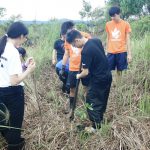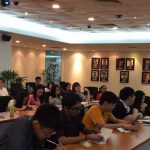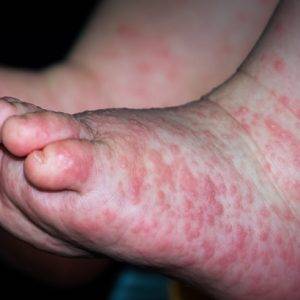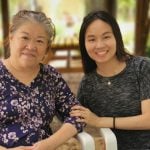The pandemic of COVID-19 has brought disruptions in human lives worldwide. Most children and teenagers are affected silently by the socio-economic impacts of the pandemic. Economic disruptions have placed some families in financial strains. School closures have led to lesser formal learning time as compared to pre-pandemic time. While looking at the impacts of pandemic on children and adolescents’ development, psychology plays a role in understanding the situation.  Our very own developmental psychologist and lecturer in IMU Psychology Department, Dr Chong Shue Ling, expressed her concerns over the silent impact of COVID-19 pandemic on children and adolescents. As Dr Chong’s research and consultation works focus on children, adolescents as well as youth development and psychology, she provided some insights for us pertaining to the current situation. For children and adolescents, this pandemic might have lifelong impacts, especially for the vulnerable and underprivileged children as well as adolescents, from disadvantaged social economic backgrounds. Opportunities to learn and play at a safe environment hence became a privilege for many children. Formal face-to-face teaching and learning in school has turned to online following school closures. Given the fact that not every household is having internet access and devices for learning to take place, equal opportunities for education among children hence became a luxury for disadvantaged children. The education gap among children of different socioeconomic backgrounds might be greater than before. Imagine that children from a poor family may need to dropout from schools to work in order to aid on family incomes; having limited access to education that causes children to have difficulty in catching up in studies, which in turn might cause the loss of interest in studies. The impacts of the pandemic on children is unthinkable and it is indeed a crisis which affects our younger generation. On the other hand, children and adolescents who are staying at home are facing another set of challenges in coping with life disruptions. They need support to cope with changes and disruptions following the change in normal schooling schedule.
Our very own developmental psychologist and lecturer in IMU Psychology Department, Dr Chong Shue Ling, expressed her concerns over the silent impact of COVID-19 pandemic on children and adolescents. As Dr Chong’s research and consultation works focus on children, adolescents as well as youth development and psychology, she provided some insights for us pertaining to the current situation. For children and adolescents, this pandemic might have lifelong impacts, especially for the vulnerable and underprivileged children as well as adolescents, from disadvantaged social economic backgrounds. Opportunities to learn and play at a safe environment hence became a privilege for many children. Formal face-to-face teaching and learning in school has turned to online following school closures. Given the fact that not every household is having internet access and devices for learning to take place, equal opportunities for education among children hence became a luxury for disadvantaged children. The education gap among children of different socioeconomic backgrounds might be greater than before. Imagine that children from a poor family may need to dropout from schools to work in order to aid on family incomes; having limited access to education that causes children to have difficulty in catching up in studies, which in turn might cause the loss of interest in studies. The impacts of the pandemic on children is unthinkable and it is indeed a crisis which affects our younger generation. On the other hand, children and adolescents who are staying at home are facing another set of challenges in coping with life disruptions. They need support to cope with changes and disruptions following the change in normal schooling schedule.
| There are some simple tips for to support children and adolescents at home: |
|---|
| Establish a regular routine for children and adolescents at home, such as consistent bed time, as well as creating a schedule for learning and relaxing activities. |
| Talk about the pandemic and provide facts. |
| Limit exposure to unverified news on social media to reduce anxiety. |
| Focus on educating what they can do to protect themselves, such as adhering to Standard Operating Procedures (SOPs). |
| Spend meaningful family time together and provide reassurance, such as having meals or read together and telling them that you love and care about them. |
(Reference: Unicef: https://www.unicef.org/coronavirus/covid-19-parenting-tips)
Parental stress has increased tremendously during this difficult time, particularly in juggling with the needs of family and work, hence self-care shall be one of the priorities for parents aside from family demands. Parents who are taking good care of themselves are being good role models for children. By looking at parents who eat healthily, having regular daily schedule, and exercise regularly, children tend to model these healthy behaviours too. COVID-19 pandemic has clearly impacted each and every one of us. According to Dr Chong, it is a time that we all should come together as a whole to fight this battle, by offering support to each other. In mitigating the on-going learning crisis as a result of pandemic, we could support those who need guidance on online learning, as well as putting in continuous effort to reduce the digital gap. The effort to tackle this on-going learning crisis would be effective through joint effort of various organizations, sectors and communities. Nevertheless, at the very individual level, we could ask the very core question to ourselves: What can I offer to help the children and teens around amidst this crisis?
“Donate the extra usable devices at home. Share internet connection with the neighbour who cannot afford it. Teach ways to utilise online resources to increase digital literacy. Teach children who do not have the luxury to access online education. Each and every one of us could make a difference!” urged Dr Chong.
| About Dr Chong Shue Ling |
|---|
| Dr Chong Shue Ling is a Developmental Psychologist and Faculty Member in the Psychology Department of International Medical University. She holds a PhD in Psychology of Child Development. She is also the only faculty member with developmental psychology background in the university, teaching the psychology programme while supervising both undergraduate and postgraduate students. The IMU Psychology Department currently offers two programmes, namely: Bachelor of Science (Hons) in Psychology, as well as Master of Counselling. The IMU Psychology programme is taught by a team of well qualified psychologists and faculty members, with various backgrounds ranging from developmental psychology, educational psychology, clinical psychology, industrial organizational psychology, neuropsychology and counselling backgrounds. |









